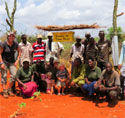 |
 |
 |
Project - Tsavo Elephant Trust Bee Fence |
 |
|
Tsavo Elephant Trust Bee Fence
tsavotrust.org
Read the Tsavo article on our partipation in the bee hive project.
Read about the ups and downs of the first year report on how the fence worked and the issues encountered.
See the success of the first half of the bee line installation: mid year report.
 The Beehive Fence project uses the behavioral discovery by The Elephants and Bees Project that African elephants will avoid honey bees. Tsavo Trust (a) deploys their successful Beehive Fence design to reduce conflict between crop-raiding elephants and small rural farms, and (b) provides beekeeping and pollination services as an income generator for poor farming families through the sale of Elephant-Friendly Honey. The Elephants and Bees Project is conducted under the umbrella of the research charity Save the Elephants (STE) in association with the University of Oxford and Disney's Animal Kingdom and in full partnership with Kenya Wildlife Service (KWS). To date 13 countries are now trying bees as a natural deterrent for crop-raiding elephants in both Africa and Asia. This is a highly impressive yet simple concept that could be a game changer in the lives of the Kamungi Community. It is interesting as the elephants who like to crop-raid in the area do so during the day and are not deterred by humans. These elephants are at high risk of being injured or killed by villagers and visa-versa.
The Beehive Fence project uses the behavioral discovery by The Elephants and Bees Project that African elephants will avoid honey bees. Tsavo Trust (a) deploys their successful Beehive Fence design to reduce conflict between crop-raiding elephants and small rural farms, and (b) provides beekeeping and pollination services as an income generator for poor farming families through the sale of Elephant-Friendly Honey. The Elephants and Bees Project is conducted under the umbrella of the research charity Save the Elephants (STE) in association with the University of Oxford and Disney's Animal Kingdom and in full partnership with Kenya Wildlife Service (KWS). To date 13 countries are now trying bees as a natural deterrent for crop-raiding elephants in both Africa and Asia. This is a highly impressive yet simple concept that could be a game changer in the lives of the Kamungi Community. It is interesting as the elephants who like to crop-raid in the area do so during the day and are not deterred by humans. These elephants are at high risk of being injured or killed by villagers and visa-versa.
The outcomes Tsavo Trust hope to achieve are:
- To reduce elephant crop-raiding in Kamungi Conservancy as a result of the fences
- To generate a secondary income from the production of "elephant-friendly honey"
- To improve human tolerance towards elephants in the concession
- To substantially improve the yield from protected crops as well as improved quality of production
- To reduce the number of elephants and people wounded or killed as a result of 'home made' deterrents such as throwing rocks, arrows and spears.
 Tsavo Trust in collaboration with Dr. Lucy King have recently successfully implemented a pilot project of installing Beehive Fences around three one acre farms in the Kamungi Conservancy bordering Tsavo East National Park. The monitoring and evaluation results are exceeding expectations and community enthusiasm is high and many more farmers have requested to have Beehive Fences installed on their land.
Tsavo Trust in collaboration with Dr. Lucy King have recently successfully implemented a pilot project of installing Beehive Fences around three one acre farms in the Kamungi Conservancy bordering Tsavo East National Park. The monitoring and evaluation results are exceeding expectations and community enthusiasm is high and many more farmers have requested to have Beehive Fences installed on their land.
The first step will be to order the required number of beehives — 15 beehives per farm — which will take up to three weeks to be constructed. In the meantime, the community will be mobilized to start collecting the posts to construct the beehive fences. Around 60 9ft posts are required for the 1 acre fence to hang 15 beehives and 15 'dummy' hives. The fence posts will be made from Commiphora trees, which grow in abundance in the area. The trees once cut and allowed to rest will easily regrow (once planted) into new trees providing shade and protection over the beehives. Once all equipment is in place, Dr. Lucy King will send her professional team to train and assist the farmer in the construction of the fence. It should take no longer than one week to complete the training and build the entire fence around the farm. We anticipate spending a further week installing the gutters and rainwater collection system at the farm. In summary, step 1 will be approximately two months. The honey is usually ready for harvest in late spring.
 The project is expected to boost the local economy and generate additional business for villagers through
the eventual sale of 'Elephant-Friendly Honey'. This will not only go towards an alternative lifestyle project, it will also provide villagers with a sense of ownership and pride and ultimately allow them to manage and be fully active themselves in this initiative.
The project is expected to boost the local economy and generate additional business for villagers through
the eventual sale of 'Elephant-Friendly Honey'. This will not only go towards an alternative lifestyle project, it will also provide villagers with a sense of ownership and pride and ultimately allow them to manage and be fully active themselves in this initiative.
Dr. Lucy King and her team will revisit the farm at the end of the season when the hives are ready for harvest and will provide training for the farmer on how to obtain the best yield and to do so safely. Once there is a sufficient supply, Tsavo Trust will then purchase the honey off the villagers using professional processing equipment will then prepare the high quality organic honey products, jar and market it as 'Elephant Friendly' as standardized by STE's Elephants and Bees Project. Proceeds will be recycled back into the community.
In summary, this project is expected to boost the local economy and generate additional business for villagers through the eventual sale of 'Elephant-Friendly Honey' as well as provide an increased level of protection against crop-raiding elephants who can easily devour one or more families precious crop and entire seasonal provisions in just one night. The anticipation is that this project will help increase tolerance and co-existence between elephants and the Kamungi Conservancy farmers and greatly reduce Human Elephant Conflict (HEC) in the area.
|
|
|